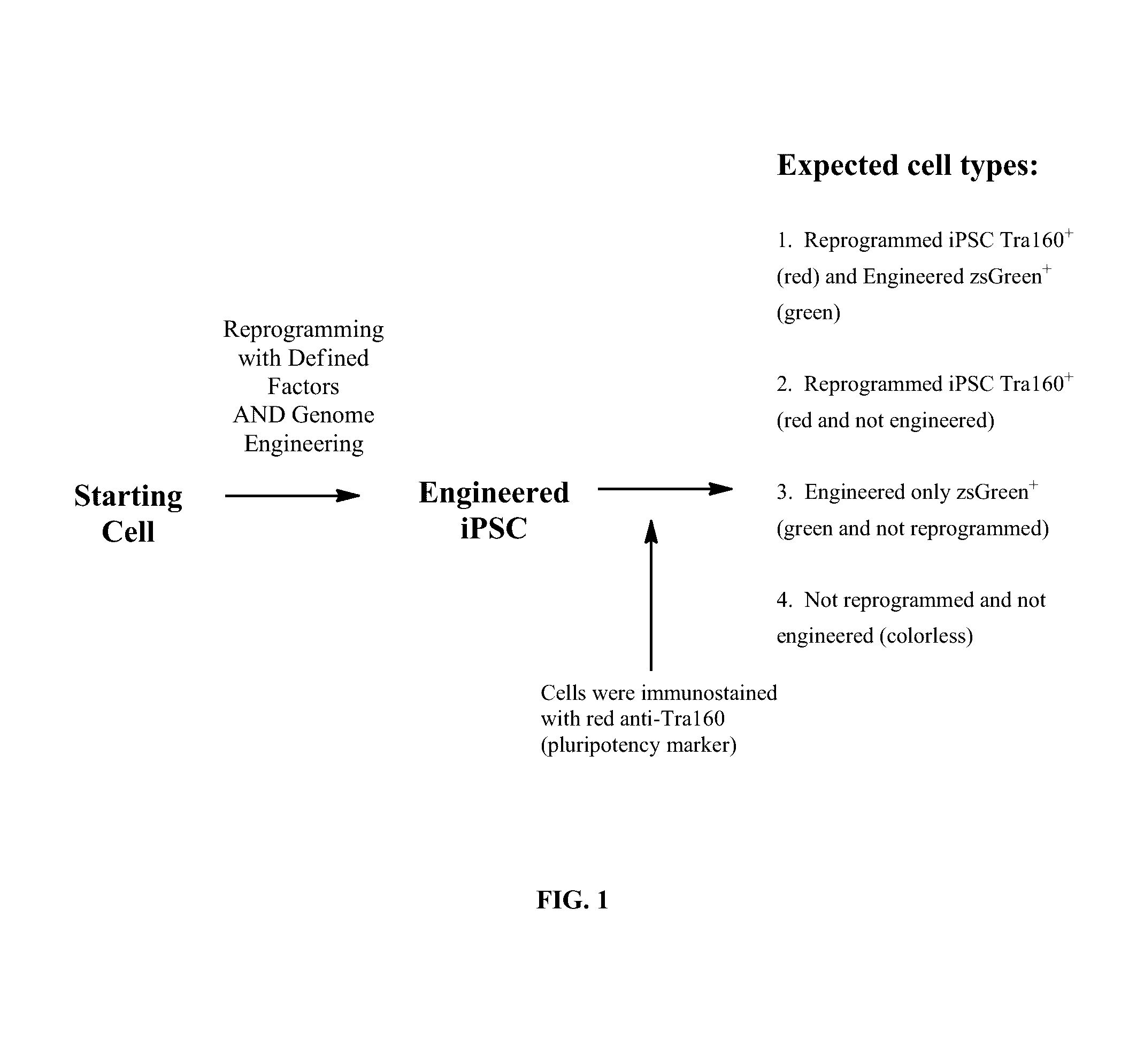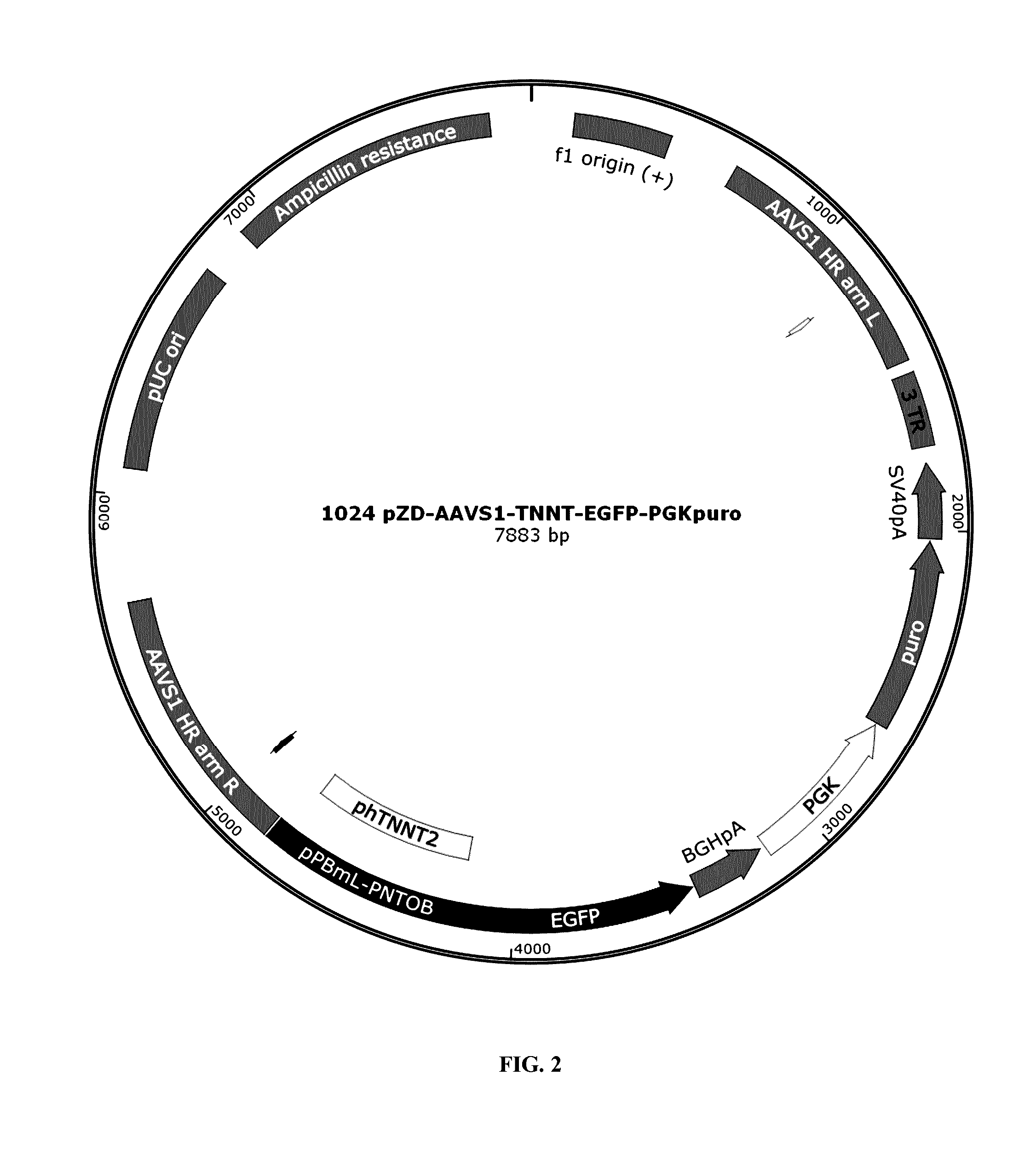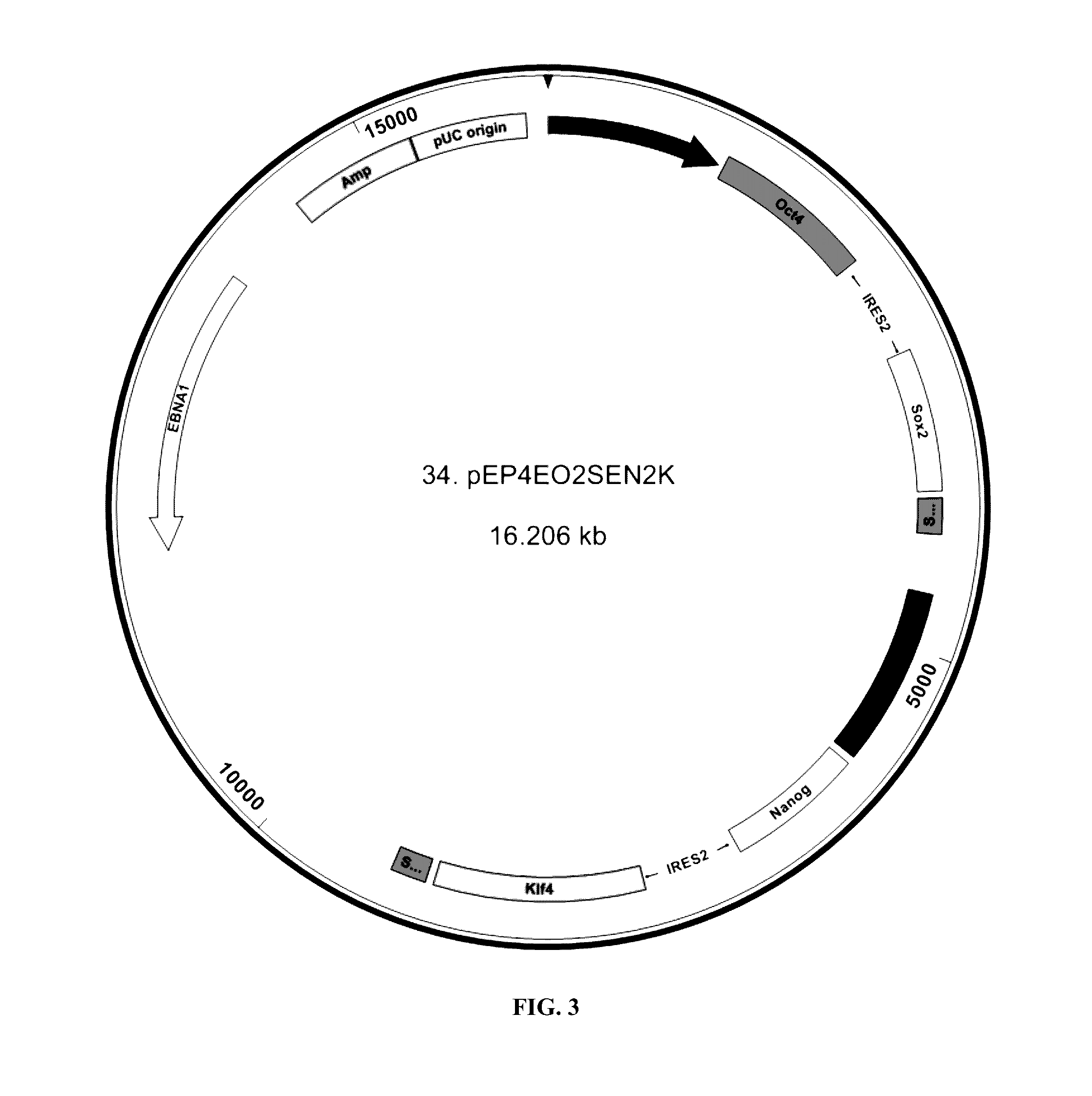Methods for cell reprogramming and genome engineering
a technology of genome engineering and cell reprogramming, applied in the field of stem cell development, can solve the problems of time-consuming, expensive and relatively inefficient process of gene reprogramming of human somatic cells to induced pluripotent stem cells (ipscs), and achieve the effects of reducing the chance of ectopically activating chromosome genes, reducing the potential toxic effect of c-myc expression, and reducing the ability to activate transcription
- Summary
- Abstract
- Description
- Claims
- Application Information
AI Technical Summary
Benefits of technology
Problems solved by technology
Method used
Image
Examples
example 1
Genome Engineering and Episomal Reprogramming of Human Foreskin Fibroblast Cells Using a Zinc Finger Nuclease
Initial Cell Preparation
[0275]Live normal human neonatal dermal fibroblast (HNDF) cells were purchased from AllCells, LLC (Emeryville, Calif., ID# NF090119, Cat# HN006002). Fibroblasts were cultured in Neonatal Human Dermal Fibroblast Medium with supplement (NHNDF basal medium+supplement) from AllCells, LLC. (Emeryville, Calif., Cat# HN006006 and HN006007). Cells from a T75 flask were split 1:10 using a standard trypsin / EDTA method and some of the cells were plated in a 12 well plate to be used to generate a kill curve using puromycin. Six wells were seeded with a 1:5 dilution of cells and 6 wells were seeded with a 1:10 dilution of cells. Six vials of cells were frozen with approximately 1M cells per vial. Frozen cells were at passage 2.
Engineering Cells
[0276]Six days post-split, confluent fibroblasts were harvested by Trypsin / EDTA dissociation. Cells were counted using a he...
example 2
Episomal Reprogramming and Genome Engineering of PBMCs Using PiggyBac
[0309]Reagents were initially prepared for the experiments. A list of such reagents is provided in Table 4.
TABLE 4Regent listMaterial / Specification / Lot # / reagent concentration Manufacturer Part # Serial #OtherEB expansionSee Table 5, below.mediumPBMCsSee belowGentamycinGibco15750-060780801StemSpan SFEMStemCell09650TechnologiesMatrigelBD35423082895DMEM / F12Gibco11330891768ReprogrammingAD1-4-1;1MediumRetroNectin 1 mg / mlTakaraT100AAA601Diluted to5 μg / ml inPBS.Platescoatedwith 1 mlPBS + / +Gibco14040764950PBS − / −Gibco14190-144872284Trypsin 0.5%Gibco15400860083Diluted to0.05% with PBS − / −Amaxa HumanLonzaVPA-1003F07990CD34 CellNucleofector KitReprogramming 1 mg / ml2.96 μg vector #34usedpEP4EO2SEN2KReprogramming 1 mg / ml3.2 μg vector #36usedpEP4EO2SET2KReprogramming 1 mg / ml2.28 μg vector #123usedpCEP4-LM2L aka(L-myc ires Lin28)1038 pPBml-PP-1.29 mg / ml1038 pPBml-4 μg usedpEFxZsGreenPP-(FIG. 3)pEFxZsGreenPBacase 1 mg / ml4 μg...
example 3
Episomal Reprogramming and Genome Engineering of PBMCs Using Zinc Finger Nuclease
[0340]The same process was used as described in Example 2 except the experimental conditions were as follows:
[0341]Wells 2.1-2.6: Zinc finger nuclease encoding RNA+Reprogramming vectors+vector 1036 for ZsGreen gene expression to be inserted by zinc-finger nuclease. DNA to be inserted at the AAVS1 zinc finger cut site. Used 12.0 μL master mix+5 μl ZFN RNA+1 million cells / nucleofection / well, as shown in Table 8 below. The general scheme is described in FIG. 9.
TABLE 8Zinc Finger nucleofection plateVectorμl / RxNμl for 7 RxNs#342.9620.72#363.222.4#1232.2815.96#10363.625.2
[0342]Control Wells 4.2-4.3: These wells became contaminated and did not produce results. No zinc finger nuclease encoding RNA+reprogramming DNA vectors+vector #1036. Used 12.0 μL master mix+1 million cells / nucleofection / well, as shown in Table 9 below.
TABLE 9Control Nucleofection plateVectorμl / RxNμl for 3.5 RxNs#342.9620.72#363.222.4#1232.28...
PUM
| Property | Measurement | Unit |
|---|---|---|
| time | aaaaa | aaaaa |
| time | aaaaa | aaaaa |
| time | aaaaa | aaaaa |
Abstract
Description
Claims
Application Information
 Login to View More
Login to View More - R&D
- Intellectual Property
- Life Sciences
- Materials
- Tech Scout
- Unparalleled Data Quality
- Higher Quality Content
- 60% Fewer Hallucinations
Browse by: Latest US Patents, China's latest patents, Technical Efficacy Thesaurus, Application Domain, Technology Topic, Popular Technical Reports.
© 2025 PatSnap. All rights reserved.Legal|Privacy policy|Modern Slavery Act Transparency Statement|Sitemap|About US| Contact US: help@patsnap.com



